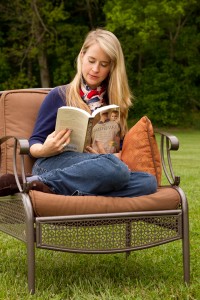Book Club Questions & Review
 A lover of people as well as words, Jolina would be thrilled to meet your book club through Skype and chat about the below questions.
A lover of people as well as words, Jolina would be thrilled to meet your book club through Skype and chat about the below questions.
Discussion Questions for The Midwife
1. One of The Midwife’s main themes is learning to trust God, even after our worst fears come true. How does Rhoda’s spiritual journey progress throughout the story? At what point does it falter? Does this remind you of your own spiritual journey? Why or why not?
2. The Midwife is told mainly through two viewpoints: Beth’s and Rhoda’s. Though they are actually one and the same, what differences do you see in their responses to hardship? What caused the change?
3. Rhoda loves her estranged mother almost to the same extent that she despises her. Have you ever had a family member who incites this kind of response in your heart? If so, how do you work through those feelings?
4. Have you ever had a family member or friend pass away before significant issues between you could be reconciled? How would you feel if you received a letter from them like the one that Rhoda receives from her deceased mother? Would you welcome such a letter or not? Why?
5. Though Rhoda is a responsible head midwife, she rejects any medical advancement because she fears that modern technology, such as electricity, will illuminate the secrets of her past. In what ways does your past thwart your ability to move forward? Is there ever a time when it’s okay not to “move on”? If so, how can you discern and identify such times?
6. Hopen Haus’s derelict state could be seen as a symbol of Rhoda’s and Amelia’s broken spirits: their facades don’t look as bad as their lives’ crumbling foundations. In what ways do we portray that we have everything together? In what ways do cultural forms, such as social media, encourage this facade?
7. The Midwife is filled with relationships between mothers and daughters, both through birth and through circumstance. In a way, the midwife Fannie Graber is a surrogate mother to Beth, just as Beth is a surrogate mother to Amelia. Who has been like a mother to you? Do you feel like this relationship adds or detracts from the one with your birth mother? Why?
8. Could you see yourself serving as a gestational surrogate like Beth (no genetic connection), or a traditional surrogate like Mary Beth Whitehead (the child genetically half yours)? How do you think the challenges—physical, emotional, and otherwise—would be different for surrogates in each of these methods?
9. Do you think that surrogacy should be legal? If so, do you think a surrogate should get paid for her services? Why or why not?
10. If you were a gestational surrogate like Beth, and the parents were contemplating terminating the pregnancy, how would you respond? Would you also run with the child, or do you believe that the parents retain the rights since you have no genetic connection? What rights should a surrogate have in such a scenario?
Discussion Questions for The Outcast
1. Why does Rachel agree to leave Copper Creek? Are her reasons good, bad, or some of each? How do her feelings of guilt play into her decision? When have you been tempted to avoid an issue or a loved one because of something you’ve done? How did you resolve it—or it is something you still need to address?
2. Although Leah and Rachel are identical twins, their personalities are starkly different. How does each of their personalities change as the story progresses? How do they remain the same?
3. Have you known any identical twins? Did the author’s portrayal ring true? Why or why not?
4. Imagine that Judah King was the one who withdrew the sheet of paper from the Ausbund, declaring him the next bishop of Copper Creek. How would might he have approached Rachel’s sin, when he was the one who loved her?
5. Do you believe that your deceased loved ones in heaven view the pain we go through on earth? Did you find Amos’s viewpoint believable? Why or why not?
6. If you were in Tobias King’s place, would you have chosen to forsake your child or your pride? The choice may seems easy in theory, but if no one knew of your involvement, would it be? What factors might influence your decision?
7. If you were in Judah’s place, could you have forgiven Rachel and still built a life with her? If you were in Leah’s place, could you have forgiven your sister’s betrayal? Have you ever been faced with a heart-rending situation like this? If so, how did you handle it?
8. What are some of the biblical allusions in The Outcast? What did they add to the story, if anything?
9. Holistic and conventional medicine are compared and contrasted throughout The Outcast. In the end, do you feel one was more effective than the other? If so, why? In what ways have your or your family encountered the tension between the two approaches?
10. Ida Mae and Rachel are similar in that they were both rejected by the communities that once sheltered them. Compare their individual responses to this rejection. It’s natural to want to turn around and reject others in the same way we’ve been rejected. How have you responded in the face of rejection?
11. In the end, Leah and Tobias decide to leave Copper Creek because of the painful memories it holds. What’s the difference between “forgiving” and “forgetting”? Why is it sometimes difficult—or even impossible—to forget a wrong, even when we’ve worked hard to forgive? Does true forgiveness have to include forgetting? Why or why not?
12. Was it startling to learn that the Plain communities struggle with the same sins as the English? Why are do you think these communities tend to be viewed in such a Utopian light?
Discussion Questions for The Alliance
1) Have you ever given much thought to the dangers of an EMP? How likely do you think it is that something like this might really happen? Is it something you should prepare for, and if so, how might you prepare? How do you balance being prepared with being controlled by fear?
2) How do Leora’s beliefs change throughout the story? Was this progression portrayed realistically? Do you think Leora will ever come back around to her pacifist beliefs? Why or why not? Have your own convictions changed from childhood to adulthood? What caused them to change?
3) Moses feels anger toward God, believing that God has spared him while letting others around him suffer and die. Has there ever been a time in your life when God’s plan felt like a punishment? How would you encourage Moses to move past his anger?
4) How does Moses’s faith change throughout the book? How do you think he will continue to grow or change spiritually in the next book?
5) Describe Leora’s feelings toward Anna. Is Leora right to feel guilty about Anna’s accident? Have you ever struggled with a similar situation? How did—or might—it affect your outlook and decisions?
6) How do Leora’s feelings toward her father shift over the course of the story? How do you think Leora should have reacted to her father’s return?
7) Were you surprised by the identity of the person stealing food from the community? What did you think of the way Leora reacted? Where would you like to see this thread go in the next book?
8) When Moses and Jabil go into town in search of a tractor, Moses vacillates on how the community views their plan. Though they do not plan to pillage or harm anyone, they are prepared to steal to better themselves and the community. If placed in the same position, would you be willing to break the law in order to save yourself or your family? Why or why not?
9) In what ways are Moses and Jabil similar? In what ways are they different? If placed in Leora’s position, which man would you find it easier to trust with your heart? Why?
10) Leora admits, “I yearn to be with Moses, as if he is my North Star in this black hole of madness, but my duty to my family forces me to remain lost.” Could the two coexist, or must Leora make a choice? Faced with a choice between love and a responsibility to your family, how would you decide?
11) Why does Leora think her grandmother might not be as anxious as everyone else despite the upheaval they’re experiencing? How have you seen this illustrated (or contradicted) in people you know? In general, why do you think we are so fearful for our lives and those of the people we love?
12) Which characters, if any, would you like to know more about? What would you like to see happen to them as the story concludes in the next book?


